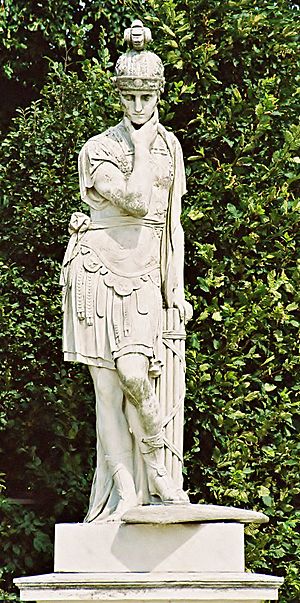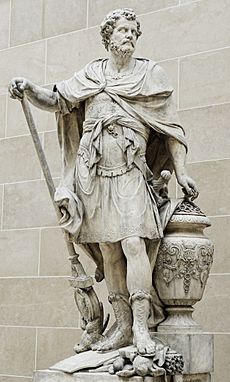Quintus Fabius Maximus Verrucosus facts for kids
Quick facts for kids
Quintus Fabius Maximus Verrucosus
|
|
|---|---|
| Born | c. 280 BC |
| Died | 203 BC |
| Nationality | Roman |
| Other names | Cunctator |
| Known for | Fabian strategy |
| Office | Consul (233, 228, 215, 214, 209 BC) Dictator (221, 217 BC) Censor (230 BC) |
| Children | Quintus Fabius Maximus |
| Awards | Grass Crown Roman triumph |
Quintus Fabius Maximus Verrucosus (born around 280 BC, died 203 BC) was a famous Roman leader and general. He was also known as Cunctator, which means "the delayer." This nickname came from his clever military plan against Hannibal during the Second Punic War.
Fabius Maximus served as a consul (a top government official) five times. He was also appointed dictator (a leader with special powers in emergencies) twice. He also held the important role of censor. His strategy involved avoiding big battles with Hannibal's strong army. Instead, he focused on cutting off Hannibal's supplies and fighting only small battles in places where Rome had an advantage. This smart approach is now called the Fabian strategy. It is seen as an early form of guerrilla warfare.
Contents
Early Life and Career in Rome

Quintus Fabius Maximus was born in Rome around 280 BC. He came from a very old and important Roman family called the Fabia gens. His family had many famous leaders, including consuls, dictators, and censors. Fabius Maximus himself had a small wart on his upper lip, which gave him the nickname Verrucosus, meaning "warty."
As a child, Fabius seemed quiet and slow to learn. He was careful in sports and appeared shy. However, these traits actually showed his calm and strong mind. As he grew up, his true qualities became clear. His carefulness was seen as wisdom, and his slowness as a sign of being thoughtful and firm.
When he was young, in 265 BC, Fabius became an augur. An augur was a religious official who interpreted signs from the gods. It is not known if he fought in the First Punic War (264-241 BC) against Carthage.
Fabius's political career began after that war. He likely served as a quaestor (a financial official) around 237 BC. Then he became an aedile (an official in charge of public works and games) around 235 BC. In 233 BC, during his first time as consul, Fabius won a great victory against the Ligurians. For this, he was given a triumph, a special parade to celebrate military success. He became a censor in 230 BC and consul again in 228 BC.
In 218 BC, Fabius was part of a group sent to Carthage. They demanded an explanation for Carthage attacking the city of Saguntum in Spain. When Carthage refused, Fabius formally declared war. This started the Second Punic War.
Becoming Dictator During the Second Punic War
After the Roman army suffered a big defeat at the Battle of Lake Trasimene in 217 BC, panic spread in Rome. Two Roman armies had been destroyed, and Hannibal was getting close to the city. The Roman Senate decided to appoint a dictator to take full control. They chose Fabius Maximus because of his age and experience.
However, Fabius was not allowed to choose his own second-in-command, called a magister equitum. Instead, the Romans chose Marcus Minucius Rufus, who was a political rival of Fabius. Fabius quickly took charge to calm the Roman people. He showed his authority by riding on horseback, which dictators usually did not do. He also had many lictors (bodyguards) with him. He even ordered the surviving consul to step down and act as a private citizen, showing that the dictator was in charge.
Fabius believed that the Roman defeats were partly because the gods had been ignored. He ordered a huge sacrifice of animals from the next harvest across Italy. He also ordered musical festivals. He even told every citizen to spend a specific amount of money (333 sestertii and 333 denarii). These actions likely helped convince the Roman people that the gods were now on their side.
Fabius's Delaying Strategy
Fabius respected Hannibal's military skill. He refused to fight Hannibal in a big, direct battle. Instead, he kept his troops close to Hannibal's army. His goal was to wear Hannibal down in a long war, called a war of attrition. Fabius's army would bother Hannibal's groups looking for food. This limited Hannibal's ability to cause damage.
Fabius also used a "scorched earth" tactic. This meant destroying crops and resources in areas Hannibal might pass through. This prevented Hannibal's army from getting food and supplies. Fabius saved his own army's strength by avoiding direct fights.
At first, the Romans did not like this defensive plan. They even called Fabius "Cunctator" (the delayer) as an insult. The strategy was also difficult because Fabius's second-in-command, Minucius, disagreed with him.
One time, Fabius had to leave the army to attend religious duties. He left Minucius in charge and told him not to attack Hannibal. But Minucius disobeyed and attacked anyway. The attack did not achieve much, but it made some enemy units retreat. The Roman people, desperate for good news, saw Minucius as a hero.
Fabius was angry when he heard this. As dictator, he could have had Minucius executed. However, a plebeian tribune (a representative of the common people) named Metilius supported Minucius. Tribunes were independent of the dictator, so Minucius was somewhat safe. Metilius convinced the people to give Minucius powers equal to Fabius.

Fabius did not fight Minucius's promotion. Instead, he waited for Minucius's recklessness to cause trouble. He knew what would happen if Minucius fought Hannibal directly. Fabius reminded Minucius that Hannibal was the real enemy. Minucius suggested they share command of the army, switching every other day. Fabius refused this. Instead, he let Minucius command half the army, while he commanded the other half.
Minucius openly said Fabius was a coward for not fighting Hannibal. Near a town called Geronium, Hannibal had set up camp. Minucius decided to launch a big attack on Hannibal's troops. It looked like the Romans were winning, but Hannibal had set a trap. Soon, the Roman soldiers were being badly defeated.
When Fabius saw Minucius's army in trouble, he rushed to help. He shouted, "We must hurry to rescue Minucius, who is a brave man and loves his country!" Fabius's forces joined the battle, and Hannibal's army immediately retreated.
After the battle, Minucius realized his mistake. He marched his men to Fabius's camp and reportedly said, "My father gave me life. Today you saved my life. You are my second father. I recognize your superior abilities as a commander." When Fabius's term as Dictator ended, the regular consul government returned.
Fabius's delaying tactics, once criticized, became respected. It is said that even Hannibal recognized and feared the Fabian strategy. After Fabius recaptured the city of Tarentum in 209 BC, Hannibal reportedly said, "It seems that the Romans have found another Hannibal, for we have lost Tarentum in the same way that we took it."
After His Time as Dictator
After Fabius finished his time as dictator, two new consuls were elected: Gaius Terentius Varro and Lucius Aemilius Paullus. They convinced the Roman people to abandon Fabius's strategy and fight Hannibal directly. Fabius was worried when he heard that Varro had raised a huge army of 88,000 soldiers. He feared that a major loss could be so bad that Rome might not be able to continue the war.
Fabius warned Paullus, the other consul, to make sure Varro did not directly attack Hannibal. Paullus replied that he feared the votes of the people in Rome more than Hannibal's army.
When news reached Rome of the terrible Roman defeat at the Battle of Cannae in 216 BC, the Senate and the People of Rome turned to Fabius for advice. They had thought his strategy was wrong before, but now they believed he was very wise. He walked through the streets of Rome, confident that Rome would eventually win, trying to comfort everyone. He placed guards at the city gates to stop frightened Romans from running away. He also set rules for mourning the dead, making sure it was done privately and quickly. After the mourning, the city was ritually cleansed. Even though he was not dictator again, his advice was followed immediately.
Honors and Death
The name Cunctator became an honorable title for Fabius. His delaying strategy was used in Italy for the rest of the war. Fabius's own military successes were small, except for taking back Tarentum in 209 BC. For this victory, he was given a second triumph, even more splendid than his first. When the governor of Tarentum tried to claim credit for recovering the town, Fabius replied, "Certainly, had you not lost it, I would have never retaken it."
After being dictator, he served as consul two more times (in 215 BC and 214 BC), and then a fifth time in 209 BC. He was also a chief augur and a pontifex (a priest), holding seats in the two highest religious colleges.
In the Senate, Fabius opposed the young and ambitious Scipio Africanus. Scipio wanted to take the war to Africa and attack Carthage directly. Fabius argued that fighting Hannibal directly was too risky. Scipio believed that attacking Carthage would force Hannibal to return to Africa to defend his home city. Scipio eventually got limited approval, even with Fabius's strong opposition. Fabius tried to block new soldiers for Scipio and limited his access to troops. Fabius wanted to make sure enough forces stayed in Italy to defend Rome if Scipio was defeated.
Fabius became very ill and died in 203 BC. This was shortly after Hannibal's army left Italy, and before Rome's final victory over Hannibal at the Battle of Zama, which Scipio won.
Part of his funeral speech is still known today. It praised his delaying strategy against Hannibal. The inscription says he "won surpassing glory by his military [exploits?]."
Fabius's Legacy
Later, Fabius became a legendary figure. He was seen as the model of a tough and brave Roman. He was given the honorable title, "The Shield of Rome." The poet Ennius wrote a famous line about him: unus homo nobis cunctando restituit rem – meaning "one man, by delaying, restored the state to us."
Virgil, in his epic poem the Aeneid, mentions Fabius Maximus as the greatest of the many great Fabii. He quotes the same famous line. While Hannibal is known as one of history's greatest generals, military experts have named an entire strategic idea after Fabius: the "Fabian strategy." Famous generals like George Washington and Mikhail Kutuzov have been called "the American Fabius" and "the Russian Fabius" for using similar delaying tactics.
The Roman princely family of Massimo claims to be descended from Fabius Maximus.
See also
 In Spanish: Quinto Fabio Máximo para niños
In Spanish: Quinto Fabio Máximo para niños
- Fabian Society, a British socialist society founded in the late 1800s. Their name comes from the tactics of Quintus Fabius Maximus.
- Gens Fabia
- List of ancient Romans
 | Isaac Myers |
 | D. Hamilton Jackson |
 | A. Philip Randolph |

